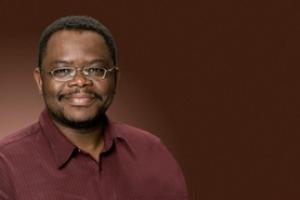
"Issues of poverty and social class, both domestically and globally, have always been especially close to my mind, perhaps because of my upbringing," explained Professor Okafor, whose father was also a lawyer and a labour activist. "He always rallied to such causes and spoke to us about them. And my mother, through her work as a secondary school teacher and community worker, also propagated similar ideas and imbued them in us."
Having grown up in Nigeria during military rule and participating in the rise of a very dynamic civil rights movement, it was no surprise that Obiora Okafor chose to pursue a career in human rights law.
Professor Okafor studied, practised and taught law in Nigeria before moving to Canada on a UBC scholarship. His time in Vancouver was a memorable one before leaving to join the law faculty at Osgoode Hall. Vancouver was where Professor Okafor met his wife, then at SFU, and where they had their son.
His time here also left a notable mark on the Faculty, especially with his doctoral dissertation that won him the Governor General Gold Medal for "best university-wide doctoral student at UBC." Professor Okafor's dissertation was on international law's attitude over the decades on the ethnic cleavages within countries.
"I broke new ground by using an interdisciplinary methodology to demonstrate that certain international law attitudes have historically contributed in significant measure to the accentuation of intra-state violence in the process of state building in many post-colonial African states," explained Professor Okafor.
In April 2011, Professor Okafor had the prestigious honour of being elected to the Advisory Committee of the United Nations Human Rights Council, a Geneva-based body of experts from around the world that serve as the Council's think tank. He sees participating on this committee as an opportunity to make an impact at a relatively high level. With all his accolades in the field of human rights, one of the accomplishments Professor Okafor is most proud of is his role as a teacher.
"I am immeasurably proud of the generations of students I have taught, some of whom are now established human rights scholars in their own right and many of whom are great activists already," explained Professor Okafor who won the Canadian Association of Law Teachers Academic Excellence Award in 2011, one of the highest honours for law teachers across Canada.
"Perhaps because of my mother`s strong influence on me, and my interest in shaping minds, I have always loved teaching. Teaching, for me, is symbiotic with research. It allows me the opportunity to test my ideas, refine them in conversation with a usually energetic and intelligent bunch of young minds, and even produce new ideas. It is also a great opportunity to give back to society by helping educate the students who will be tomorrow`s leaders and actors. Beyond all these benefits, I almost feel like I was always meant to be a teacher, because I gravitated toward it so naturally."
First published on August 13, 2016.